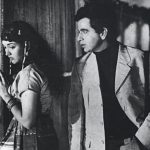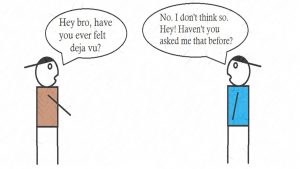There are few movies based on the theme of Deja Vu such as Tony Scott’s action film Déjà Vu which gives a thrilling account of one man and his ability to utilise a ground-breaking technology in order to travel back in time and stop a bombing from happening. Starring Denzel Washington Déjà Vu is gripping and stunning cinema which sets you thinking about this incredible experience. Déjà Vu is an experience for split of seconds or few moments – it happens when you are in an entirely strange, a new situation, a new place, you bump into some unknown person….however, and the experience seems very familiar, as tho ugh you have seen it before, you have been there or you know this person you are meeting for the first time. It happens to both children and adults and usually, the feeling of déjà vu is triggered by a particular place, a stranger, an unfamiliar setting sometimes even some food — taste and aroma.
ugh you have seen it before, you have been there or you know this person you are meeting for the first time. It happens to both children and adults and usually, the feeling of déjà vu is triggered by a particular place, a stranger, an unfamiliar setting sometimes even some food — taste and aroma.
During a trip to Africa, Carl Jung described a feeling of déjà vu when he viewed a slim, black man leaning on a spear looking down at his train as it made a turn around a steep cliff on the way to Nairobi. He writes, “I had the feeling that I had already experienced this moment and had always known this world.” Although this world and this man were something alien to him, he saw the whole thing as perfectly natural. He called this recognition of what was “immemorially known.”
The famous Hindi Movie Madhumati of 1958 is a gripping story which revolves around Devendra (Dilip Kumar) and his memory from an earlier life, in which he is Anand, who falls in love with Madhumati (Vyjayantimala). They are separated, when Madhumati embraces death to escape a rape by Ugranarayan, played to perfection by Pran. Destiny brings Madhavi to rebirth of Madhumati and she helps Anand dig out a confession from Ugranarayan. In a chilling sequence, Anand discovers that it is the ghost of Madhumati, who returns to seek justice. Madhumati had all the elements of a typical Hindi Film Pot-boiler. The Haveli in which the hero experiences a sense of déja vu leading to his flashback, the naive and innocent village belle, the pardesi babu (city man) and the lecherous zamindar(land owner) lusting after the belle. Director Bimal Roy used these elements to utmost advantage.
What happens in déjà vu is that within split-second information is transferred from one side of the brain to the other. One side of the brain would then get the information twice – once directly, and once from the ‘in charge’ means the controlling side. So the person would sense that the event had happened before. This links back to the idea that déjà vu might have been caused by a strong feeling of familiarity. The familiarity is signalled by brain cells in the temporal lobe, but is noticed and ignored by another part of the brain that checks whether all the signals coming to it make sense.
After experiencing deja vu a person feels startled, perplexed feeling dazzled about his experience. It is a French word for ‘already seen’. Émile Boirac was the French philosopher, parapsychologist and a psychic who coined the word and since then a lot of discussion and research has taken place around has world.
Most of us have had the impression of re-visiting specific place, a specific incident in our dreams. There is apparent feeling of familiarity or a hazy memory of the dreamscape, a sort of dream déjà vu. An Experiment with Time is a book by the British soldier, aeronautical engineer and philosopher J.W.Dunn (1875–1949) on the subjects of precognitive dreams and a theory of time. The book was published in March 1927, it was widely read and his ideas were explored by many other authors. Dunne has experienced many dreams and he wrote that such precognitive visions foresee future personal experiences by the dreamer.
The second half of the book explains that the moment of “now” is not described by science. Contemporary science described physical time as a fourth dimension and Dunne’s argument led to an endless sequence of higher scope of time to measure our passage through it. According to Dunne, our wakeful attention prevents us from seeing beyond the present moment, whilst when dreaming that attention fades and we gain the ability to recall more of our timeline. This allows fragments of our future to appear in pre-cognitive dreams, which are mixed in with fragments or memories of our past.
One important point to note is that spiritual people have recurrent experiences of déjà vu. Their Higher Self connects with them more easily and more often. Sometimes we feel for flash of seconds that we are with right people and everything is going good. This happens because our soul tries to tell us that we are with the right people and everything is great. It is very a subtle message which comes from our soul. Many people tend to brush it off as a chance. You may often feel that there’s something deeper going on that cannot be explained, that cannot be seen either, but it gives you the feeling something is going to happen……..this is because you are picking up on the motivations, intentions and feelings of either your own and sometimes others around you.
Deja Vu is experienced by most of the people, almost 90%, but most don’t pay attention and just brush it off. You cannot have everyone answer their experience of Deja Vu because a person should first point whether the brain is/was thinking it or the person has/had experienced something before or not. And, not being able to answer it, is failing of memory.














































